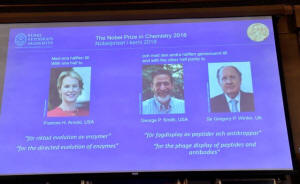|
Trio wins chemistry Nobel for work on
antibody drugs and detergents
 Send a link to a friend
Send a link to a friend
 [October 03, 2018]
By Daniel Dickson and Ben Hirschler [October 03, 2018]
By Daniel Dickson and Ben Hirschler
STOCKHOLM/LONDON (Reuters) - Two Americans
and a Briton won the 2018 Nobel Prize for Chemistry on Wednesday for
harnessing the power of evolution to produce novel proteins used in
everything from environmentally friendly detergents and biofuels to
cancer drugs.
The fruits of this work include the world's top-selling prescription
medicine -- the antibody injection Humira sold by AbbVie for treating
rheumatoid arthritis and other autoimmune diseases.
Frances Arnold of the California Institute of Technology, George Smith
from the University of Missouri and Gregory Winter of Britain's MRC
Laboratory of Molecular Biology were awarded the prize for pioneering
science in enzymes and antibodies.
Arnold, only the fifth woman to win a chemistry Nobel, was awarded half
of the 9 million Swedish crown ($1 million) prize while fellow Smith and
Winter shared the other half.

"This year's Nobel Laureates in Chemistry have been inspired by the
power of evolution and used the same principles – genetic change and
selection – to develop proteins that solve mankind's chemical problems,"
the Royal Swedish Academy of Sciences said.
Arnold is the second woman to win a Nobel prize this year after Canada's
Donna Strickland shared the physics award on Tuesday.
Her research on enzymes -- proteins that catalyze chemical reactions --
laid the bedrock for the development of better industrial chemicals and
pharmaceuticals.
Smith developed a method using a virus that infects bacteria to produce
new proteins while Winter used the same phage display technique for the
directed evolution of antibodies, with the aim of producing more
effective medicines.
[to top of second column]
|

Pictures of the 2018 Nobel Prize laureates for chemistry: Frances H.
Arnold of the United States, George P. Smith of the United States
and Gregory P. Winter of Britain are displayed on a screen during
the announcement at the Royal Swedish Academy of Sciences, in
Stockholm, Sweden, October 3, 2018. Jonas Ekstromer/TT News
Agency/via REUTERS

Humira, or adalimumab, was the first drug based on Winter's work to
win regulatory approval in 2002.
The prizes for achievements in science, literature and peace were
created and funded in the will of Swedish dynamite inventor and
businessman Alfred Nobel and have been awarded since 1901.
For the first time in decades, the Nobel line-up did not feature a
literature award after a rift within the Swedish Academy over a rape
scandal involving the husband of a board member left it unable to
select a winner.
The science and peace prizes are selected by other bodies. Chemistry
is the third of this year's Nobel Prizes after the winners of the
medicine and physics awards were announced earlier this week.
(Additional reporting by Niklas Pollard and Simon Johnson;
additional reporting by Anna Ringstrom and Helena Soderpalm; Editing
by Richard Balmforth)
[© 2018 Thomson Reuters. All rights
reserved.]
Copyright 2018 Reuters. All rights reserved. This material may not be published,
broadcast, rewritten or redistributed.
Thompson Reuters is solely responsible for this content.
 |